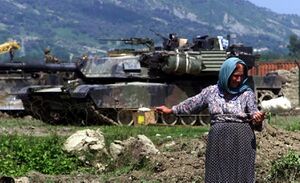Acrean Intervention in the Refusal War: Difference between revisions
No edit summary |
No edit summary |
||
| Line 34: | Line 34: | ||
}} | }} | ||
'''Acrean Intervention in the Refusal War''', code named '''Operation Tveegget''', began in January 1984 in accordance with a mutual cooperation agreement between the government of the [[Republic of Syara]] and Acrea. Concerns over rising Warden nationalist ideology in Syara led Acrean officials to open back channel communications with Royalist aligned officials in 1979. Although traditionally adversaries due to Acrea's longstanding close relationship with and support for [[Ruvelka]], both parties recognized the [[Wardens (Syara)|Wardens]] as a mutual threat; the Acreans assessed that the Wardens would heighten threats to Ruvelka and increase the risk of major war breaking out, while the Royalists feared the elimination of their political influence in Syara should the Wardens seize power | '''Acrean Intervention in the Refusal War''', code named '''Operation Tveegget''', began in January 1984 in accordance with a mutual cooperation agreement between the government of the [[Republic of Syara]] and Acrea. Concerns over rising Warden nationalist ideology in Syara led Acrean officials to open back channel communications with Royalist aligned officials in 1979. Although traditionally adversaries due to Acrea's longstanding close relationship with and support for [[Ruvelka]], both parties recognized the [[Wardens (Syara)|Wardens]] as a mutual threat; the Acreans assessed that the Wardens would heighten threats to Ruvelka and increase the risk of major war breaking out, while the Royalists feared the elimination of their political influence in Syara should the Wardens seize power. | ||
Acrean foreign policy | Discussions in Acrea over potential strategies to suppress Warden ideology in Syara were ongoing in public political discourse throughout 1980. Declassification of contemporary documents mandated by the [[Riksdag]] in 1998 revealed that against this backdrop, simultaneous clandestine dialogue between Chancellor Wolfgang Matthes' and Syaran President [[Krunislav Mircevski]] resulted in a covert agreement in 1981. In the face of increasingly aggressive Warden rhetoric and increasing political instability, the agreement stipulated that Acrea would provide material and military support to the Royalists if military action became necessary to manage any Warden threats to the Royalist power base. | ||
Acrean foreign policy strongly stood behind the Royalists throughout the years preceding the conflict. Matthes issued persistent statements of support backing President Mircevski's attempts at reconciliation, worded with a distinct sympathy for Royalist factions of the Syaran government. Although the events building to the outbreak of violence throughout 1983 did not fall under the circumstances envisioned in the 1981 agreement, Mircevski's sudden death and the Warden push to power pressed the Acreans towards immediate intervention, in cooperation with Royalist factions of the government. | |||
[[Category:Syara]][[Category:Acrea]] | [[Category:Syara]][[Category:Acrea]] | ||
Revision as of 13:29, 23 February 2023
| Operation Tveegget | |||||
|---|---|---|---|---|---|
| Part of the Refusal War | |||||
 Strv122s in a Syaran village, 1986 | |||||
| |||||
| Belligerents | |||||
|
|
| ||||
| Units involved | |||||
| Acrean Armed Forces |
| ||||
| Strength | |||||
|
30,000 troops 800 aircraft |
543 aircraft 4,285 air defense systems | ||||
Acrean Intervention in the Refusal War, code named Operation Tveegget, began in January 1984 in accordance with a mutual cooperation agreement between the government of the Republic of Syara and Acrea. Concerns over rising Warden nationalist ideology in Syara led Acrean officials to open back channel communications with Royalist aligned officials in 1979. Although traditionally adversaries due to Acrea's longstanding close relationship with and support for Ruvelka, both parties recognized the Wardens as a mutual threat; the Acreans assessed that the Wardens would heighten threats to Ruvelka and increase the risk of major war breaking out, while the Royalists feared the elimination of their political influence in Syara should the Wardens seize power.
Discussions in Acrea over potential strategies to suppress Warden ideology in Syara were ongoing in public political discourse throughout 1980. Declassification of contemporary documents mandated by the Riksdag in 1998 revealed that against this backdrop, simultaneous clandestine dialogue between Chancellor Wolfgang Matthes' and Syaran President Krunislav Mircevski resulted in a covert agreement in 1981. In the face of increasingly aggressive Warden rhetoric and increasing political instability, the agreement stipulated that Acrea would provide material and military support to the Royalists if military action became necessary to manage any Warden threats to the Royalist power base.
Acrean foreign policy strongly stood behind the Royalists throughout the years preceding the conflict. Matthes issued persistent statements of support backing President Mircevski's attempts at reconciliation, worded with a distinct sympathy for Royalist factions of the Syaran government. Although the events building to the outbreak of violence throughout 1983 did not fall under the circumstances envisioned in the 1981 agreement, Mircevski's sudden death and the Warden push to power pressed the Acreans towards immediate intervention, in cooperation with Royalist factions of the government.